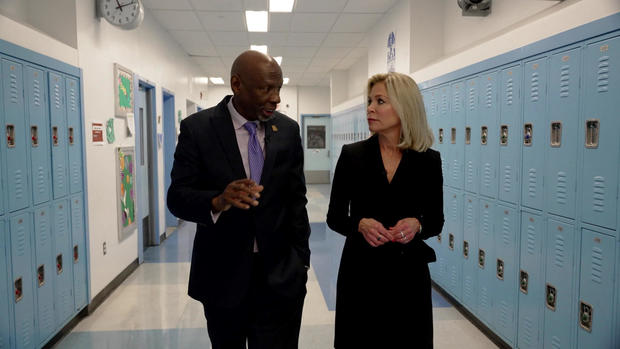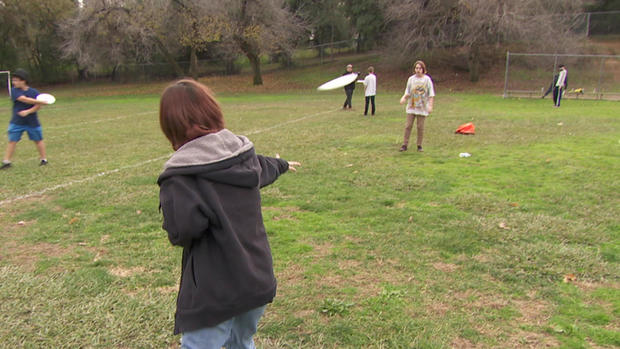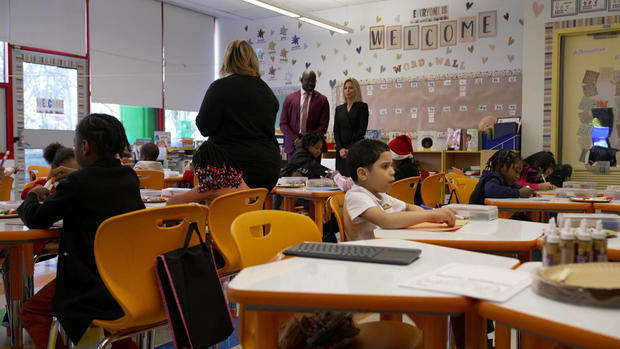It might seem like the pandemic is over; stadiums are open once more, crowds are in every single place, and infrequently a masks in sight. But COVID harm a large number of issues you’ll be able to’t simply see, particularly in faculties. “I feel like I just need to stand on a mountaintop and just yell, ‘Take this seriously! Everything is at stake right now!'” mentioned Geoffrey Canada, founding father of the Harlem Children’s Zone in Manhattan.
He mentioned that relating to how the pandemic affected education, the news was once unexpected, and undoubtedly now not in a great way. “We’ve got the data now, and things are bad; they’re actually worse than most of us thought,” mentioned Canada. “In fact, I would tell you that we have an education crisis right now.”
CBS News
The exact numbers range by means of group, however consistent with a national check given to 4th and eighth graders, the National Assessment of Educational Progress, studying abilities dropped to the bottom level in 30 years.
And in math, just about 40% of 8th graders could not perceive fundamental ideas – the worst efficiency since trying out started again in 1969.
Canada mentioned, “This is not just poor kids who are living in the urban centers. It’s all over America. There’s been a dramatic drop in ELA and in math scores. This goes along with the loss of students in school, with the increased violence that’s happening, and the behavioral problems that kids are facing. In my career of more than 45 years, I’ve never seen anything like this.”
And it isn’t laborious to look the way it came about. Experts say far off educating and a loss of computer systems at house are accountable. Add to that the concern of staring at your members of the family die, and it is no surprise thousands and thousands of younger other folks had bother finding out, and even making it throughout the day.
Heather Hhuszti, leader of psychology at Southern California’s Children’s Hospital Orange County, mentioned even she could not consider what number of youngsters wanted assist. “We have seen an increase of 50% in the number of children presenting to our emergency department from the beginning of the pandemic to last fiscal year.”
“Kids were in some sort of mental health crisis?” requested Smith.
“Yes. What we’re saying (those of us in children’s mental health) is, it was burning embers even before the pandemic, and the pandemic came and just threw gasoline on that fire. We’re seeing more and more kids come in who are having suicidal thoughts; we’re seeing more and more kids come in who are like, ‘My grades have dropped, I can’t function anymore.’ And if we don’t help kids sort of manage some of these mental health concerns, they can’t learn effectively. These kids are struggling.”
And here is one thing else that may take your breath away: A University of California learn about discovered that throughout the pandemic, kids spent an average of 17 minutes a day less on physical activity. Now, 17 mins may now not look like so much, however over the years the ones small losses can in reality upload up.
During the pandemic some youngsters did not move out in any respect, a lot much less do any more or less workout. So, now gymnasium lecturers like Dan DeJager at Meraki High School close to Sacramento are taking part in catch-up. Instead of extremely regimented sports activities and PE categories, DeJager runs a program designed to ease youngsters again into bodily job by means of having them do anything else that can get them shifting once more, like relay races or frisbees.
CBS News
Smith requested, “At this point in these kids’ lives, these are the habits they’re developing for the rest of their life?”
“It’s like wet cement,” DeJager mentioned. “We only have so much time to make a positive impression on our students. And so, we want to use that time as wisely as we can and the best we can. And we’ve lost a little bit of that time. Now that we’re back in person, we’re trying to get there again.”
Of direction, retaining youngsters lively can do as a lot for his or her minds as their motor abilities. Huszti mentioned, “Levels of activity for mild to moderate depression can be as effective as medication. So, if we’re active, if we’re doing well at school, that can affect your mental health, and your mental health can affect those things as well. So, you get that vicious cycle going, right? There’s a linkage there. It’s all connected.”
But the larger image right here, consistent with educators like Geoffrey Canada, is this will probably be one of those lost technology: under-educated to the purpose the place it drags down their long run, and ours.
“There’s a whole cohort of young people who are not going to get the kind of education that’s going to allow them to get the best jobs,” Canada mentioned. “It’s going to price plenty of youngsters tens of hundreds of bucks over their income, or some masses of hundreds of bucks.
“We keep forgetting that this is about America,” he mentioned. “That eight-year-old is going to be 20 when you blink your eye, and 25 in a short period of time. She needs to be an engineer. He needs to be a medical doctor. We need to start thinking about these kids as the resources for this country.”
Canada mentioned there are methods to mend this, like extensive tutoring all through the week; extending the college day; and retaining school rooms open in the summertime.
Seems he is aware of what he is speaking about: The Harlem Children’s Zone, which takes youngsters, as they are saying, “from cradle to college,” has turn out to be a style for good fortune. So, how did the pandemic hit them? They say math ratings dipped a bit of, however English stayed about the similar. And in 2021, one hundred pc of the college’s graduating seniors had been authorised to school.
CBS News
Harlem Children’s Zone CEO Kwame Owusu-Kesse says the ones numbers are evidence that such things as extensive tutoring paintings, as does paying lecturers additional to stick after college. “There’s no replacing the work that needs to be done by short-changing the investment in time, extra time for our young people in the classroom with the educators,” he mentioned.
And there could also be a silver lining for the remainder of the rustic. When requested what she thinks issues will seem like ten years from now, psychologist Heather Huszti mentioned, “I feel like we could be raising a generation that’s going to be a lot more attuned to people’s pain, that’s going to be a lot more attuned to helping each other understanding the importance of connection. And that may actually lead us into a better place. So, I remain an optimist, even as we’ve gone through a very hard time. I don’t think we’re through it yet. But I do think we can come through and be better.”
For extra data:
Story produced by means of John D’Amelio. Editor: Carol Ross.
See additionally:





